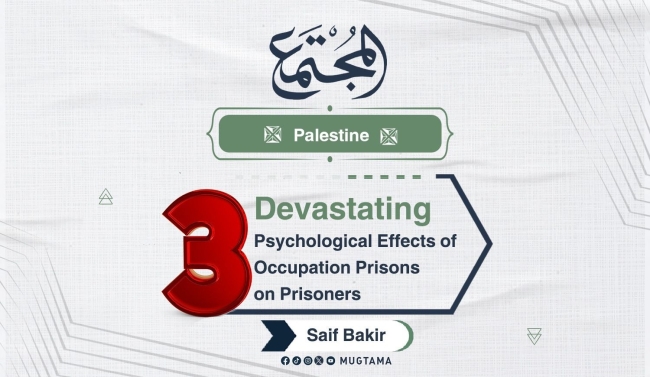3 Devastating Psychological Effects of Occupation Prisons on Prisoners Featured
Israeli occupation prisons are a stage for the most brutal forms of repression and abuse practiced by Zionist authorities against Palestinian prisoners.
In these prisons, it's not just about restricting freedom; prisoners are subjected to various forms of physical torture and psychological intimidation. They are exposed to solitary confinement, sleep deprivation, and exhausting long interrogations aimed at breaking their will and destroying their determination.
Even after their release, the effects of this harsh experience remain engraved in their memory, leaving psychological wounds that do not heal easily. This makes prison for them more than just a place of detention, but rather a painful station that changes the course of their lives forever.
Among the most prominent psychological effects that the occupation's prisons leave on the souls of Palestinian prisoners are:
1- Post-Traumatic Stress Disorder (PTSD):
Many Palestinian prisoners suffer from PTSD as a result of the physical and psychological torture they endure in the occupation's prisons.
This disorder manifests in the form of recurring nightmares, painful flashbacks, and a constant state of tension and anxiety.
In June 2024, Gaza prisoner Badr Dahlan appeared in a severe psychological state due to the torture he was subjected to during a month of his detention in the occupation’s prisons. He struggled to complete his sentences, stuttered while speaking, and his eyes were bulging, indicating a state of hallucination and incoherent speech.
2- Depression and Isolation:
Being held in solitary confinement for long periods makes prisoners feel isolated and disconnected from reality, which can lead to difficulties in adjusting to society upon their return. This may develop into depression or social isolation.
Nabil Al-Rajoub, one of the Palestinian prisoners, was released by the occupation in December 2021 after administrative detention for eight months in "Megiddo" prison. He was placed in solitary confinement for 10 days before his release, and his family was unable to contact him or get any information about him during his isolation, as the occupation prevented his lawyer from visiting him. This caused him severe psychological distress, leading to a nervous breakdown, according to his brother, as reported by the Palestinian News Agency (WAFA).
3- Memory Loss:
Memory loss is one of the significant challenges faced by freed prisoners, requiring specialized psychological support to help them overcome these difficulties and regain their lives.
Freed Palestinian prisoner Mansour Al-Shahatit spent 17 years in the occupation’s prisons and was released on April 9, 2021.
Al-Shahatit suffered from partial memory loss, struggling to recognize his family members due to the hardships he endured inside the prisons, in addition to the medical negligence he faced, according to Al-Araby website.
-------------------------------------------------------------


